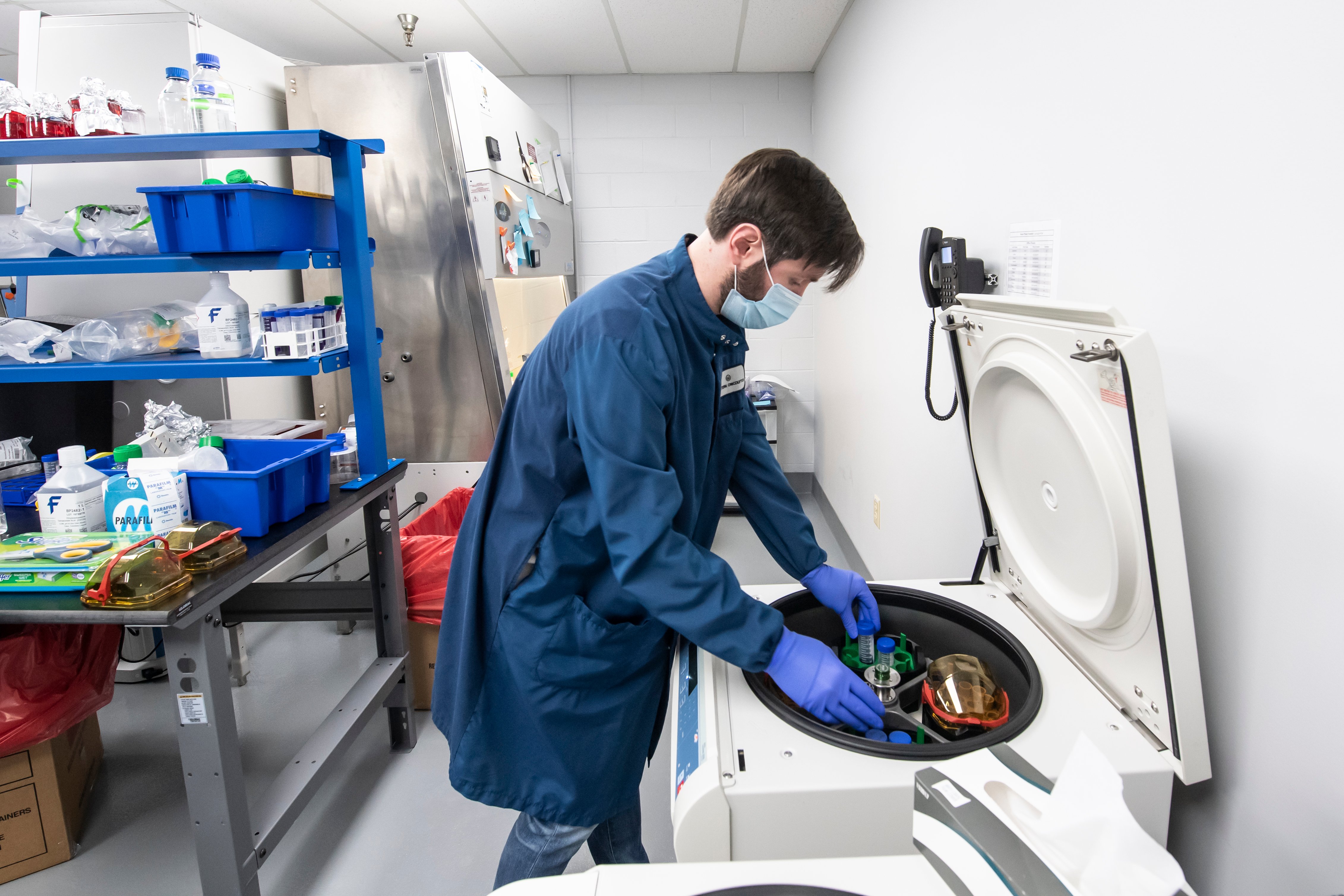Since forming a startup around his oncolytic virus cancer therapy research six years ago, Steve Thorne has managed to attract two major pharmaceutical partners to develop portions of his platforms and has in-licensed more Pitt technology.

KaliVir Therapeutics founder and chief science officer Stephen Thorne shows experiments where oncolytic viruses infect cancer cells.
When Steve Thorne left his faculty position at Pitt to launch a startup based on his research five years ago, it was a huge leap of faith.
He was demonstrating confidence in the future of the paradigm-shifting immunotherapy approach to treating cancer that works to unleash the body’s immune system against the disease. That faith was soon rewarded when his company, Western Oncolytics, entered into a development agreement with pharmaceutical giant Pfizer to develop the company’s initial therapy candidate.
But he was just getting started.
Now he has formed another partnership, this time with Japanese pharmaceutical company Astellas, for the development of two new oncolytic viruses. These are genetically modified viruses designed to selectively infect tumor cells, while bypassing normal cells, not only killing the cancer cells, but also inviting the body’s own immune system to identify the cancer as a foreign substance in need of disposal.
As part of the agreement, a new subsidiary of Western Oncolytics created to house the new partnership, called KaliVir Therapeutics, will receive up to $56 million in upfront payments to support preclinical activities for the initial lead therapy and a second therapy. The agreement states that Astellas could pay an additional $578 million to further develop the two therapy candidates through the clinical trial process.
Even with two major pharmaceutical partnerships under his belt, Thorne, the company’s chief science officer, is still plotting new directions to take Western Oncolytics & Kalivir’s platform in order to deliver other therapeutic payloads to disrupt cancer’s clever self-preservation mechanisms.

Monica Cantos, a technician at KaliVir, examining cells under a microscope.

Joseph Benes, a junior scientist at KaliVir, loading a centrifuge to purify a virus.
The company recently in-licensed a pair of technologies from Thorne’s former Pitt colleagues Greg Delgoffe, professor of immunology, and Andrew Hinck, professor of structural biology.
One of the ways that cancer may thwart the body’s immune system is by restricting the metabolism of T-cells that help drive the body’s immune response.
“The T-cells become exhausted by the tumor environment. Greg’s (Delgoffe) work enhances the activities of T-cells in the tumor environment by boosting their metabolism,” Thorne said.
Delgoffe’s labs’ research demonstrated that an oncolytic virus engineered to carry the gene for leptin, a regulatory hormone for metabolism, shrank melanoma tumors in mice substantially, including total eradication in a quarter of the specimens.
Thorne is currently seeking to raise funding for the development of these new therapies, and others.
Thorne last year brought on Helena Chaye to be the new CEO of Western Oncolytics, focusing on business development and operations management. Chaye, who remains based in San Francisco, was one of the first employees of a company Thorne helped found many years earlier when he was based at Stanford University.
In Pittsburgh, Kalivir is growing into space Thorne leased at the RIDC Park in O’Hara several years ago. It currently employs 18, and Thorne said he expects to be hiring more people later in the year to help bring the Astellas partnership to clinical trial and build out the other platform opportunities.
Thorne said he is seeing tangible signs that the life science sector in Pittsburgh is beginning to gain traction, adding that he chose to remain in Pittsburgh due to the affordability of lab space and the high quality of graduate students.
“There are a whole slew of exciting small biotech companies springing up,” he said. “The region has been building the funding and support structures over the past 3-5 years, driven by Pitt, CMU, UPMC and other health networks.”
If your Pitt research has resulted in an innovation that you believe may be the foundation for a startup company, don’t hesitate to contact us at innovate@innovation.pitt.edu to see how we may be able to help. Or, check out our First Gear program where you can test the market potential of your innovation in a low-risk setting and receive hands-on business mentoring and commercialization funding.